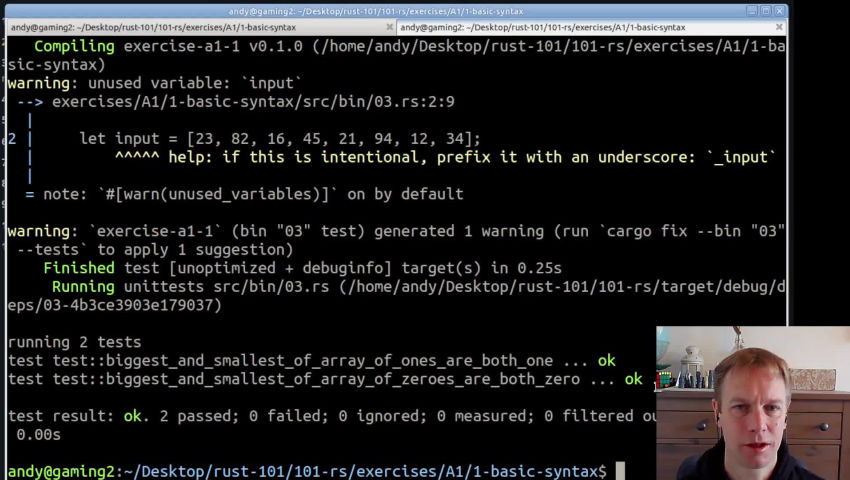- cross-posted to:
- andybalaam_lectures@diode.zone
- cross-posted to:
- andybalaam_lectures@diode.zone
cross-posted from: https://diode.zone/videos/watch/9766d1f1-6018-48ec-ad67-e971758f8a3a
Going through some exercises on basic Rust syntax and ownership.
Links:
Exercises: https://101-rs.tweede.golf/A1-language-basics/mod.html
Slides: http://artificialworlds.net/presentations/rust-101/A1-intro-to-rust
Rust 101 is a series of videos explaining how to write programs in Rust. The course materials for this series are developed by tweede golf. You can find more information at https://github.com/tweedegolf/101-rs and you can sponsor the work at https://github.com/sponsors/tweedegolf . They are released under the Creative Commons Attribution Share Alike 4.0 International license.
This series of videos is copyright 2023 Andy Balaam and the tweede golf contributors and is released under the Creative Commons Attribution Share Alike 4.0 International license.
These videos are roughly on track with the Reading Club apparently, so this video belongs here this week, I think.



That makes a lot of sense. Intuitively I figured it would be something like that.
Still, as a compilation error, it’s confusing to see an error on the unit type being inconsistent when the issue is really an untyped return. Though now I know what the unit type is it’s a bit clearer what such a compiler error is about.
This behavior is simple, it just wasn’t explained to you at the correct level.
All blocks (code between
{and}) evaluate to some value, they’re all treated as expressions. A function “without a return type” will always return()because that’s what a block that doesn’t have any “output” “returns”.This understanding is fundamental to Rust and, for example, is involved in understanding when we have to and don’t have to use
returnin a function. Quite usefully, it also allows us to organize our code by creating a new scope, i.e.let foo: u32 = { // Hate dropping mutex guards explicitly? This is one way you can avoid that (although it's arguably a code smell that I discourage and should not have even mentioned) // This block evaluates to 100 100 };let foo: () = { println!("this block evaluates to the unit type"); }The way Rust interprets the issue with your function is:
()because it doesn’t have an explicit return valuei32which is not()The reason the error is perhaps more unclear than it could be is because they assume you have read the Rust book or understand how blocks are expressions themselves.
It would be valuable to look at https://doc.rust-lang.org/book/ch03-03-how-functions-work.html for more details and to gain a more thorough understanding of the topic at hand. I left out the precise details on “which expression from the block is the one that it evaluates to” other than the obvious case of “the very last expression”.
I’m not so sure that this is the issue. I understood that blocks are expressions. The issue was that I didn’t know that type inference doesn’t apply to function returns (generally). That such is not true is easy to guess, but I’d presumed as much because the task of inferring seemed no more difficult than local variable type inference.
And so given that it’s such a simple and essential requirement, I’m not sure it wouldn’t be simpler and better to have a compiler error that simply states that an explicit return type is required.
Seeing instead that the return type was understood to be the unit type is also confusing as the function block clearly had a return value (here, AFAIU, explicit/implicit return makes no difference). So instead of wondering about the need for an explicit return type I immediately wondered about what type the function was actually returning (ie, had I accidentally created
()).Of course I didn’t know about the unit type etc. But even so, as a compiler error, it’s represented in pieces rather than cutting to the core requirement of an explicit return type. Perhaps a reminder better left to a linter. I’d guess clippy warns you about this, but I thought I’d just rely on the compiler for as long as I can.